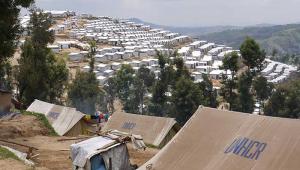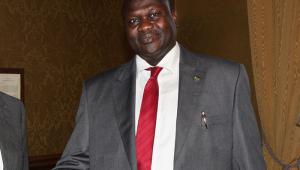The NGO called on both parties in the east African nation and the international community to focus on ensuring economic changes included in the peace agreement are implemented, and that ordinary citizens are able to make their voice heard during the political process.
“A peaceful South Sudan cannot be build without solid foundations,” said Zlatko Gegic, Oxfam country director in South Sudan. “[The country’s] economy is in crisis and without economic reform, its people will continue to suffer and the fragile peace process will be jeopardised.
“This transitional period offers the government of South Sudan an opportunity to change this direction – and the international community must support this critical process.”
South Sudan’s brutal two-year conflict officially ended earlier this year when president Salva Kiir and his long-time arch rival and leader of the rebels, former vice president Riek Machar, formed a power-sharing government designed to end the civil war that first began with a fall-out between the two men.
However the violence still rages in many regions of the country and areas that had previously been spared from the conflict have been dragged in to the fighting.
The fragility of the peace agreement is exacerbated by the country’s economic crisis, which has seen driven the nation’s currency in to a tailspin and seen inflation sky rocket to almost 300%.
Oxfam said the majority of working South Sudanese are now poorer than they were nearly a decade ago and struggling to purchase even staple foods, both locally produced and imported, at the inflated prices.
Fuel shortages and power outages are commonplace, wages for public sector workers go unpaid and several sectors are threatening strikes. The IMF estimates the transitional government’s budget deficit could top $1bn in 2016/17.
Donors are holding off on providing support to South Sudan until progress has been made, but last month the IMF called for action, including cash for the budget from international actors, to prevent the country descending once again into chaos.
The peace deal contains a number of requirements in terms of institutional reform, resource management, public financial management and other economic and fiscal measures to stablise an economy ripped apart by war, low oil prices and poor management.
Oxfam stressed that these measures be implemented urgently and that the peace arrangement be protected.
“This country needs investment: in its people, its economy and its future. The transitional government and international community must learn from the pact and listen to South Sudan’s citizens at every step in this transitional period,” said Gegic.
South Sudan, the world’s youngest country, has not seen stability since it was established by gaining independence from Sudan in 2011.
By 2013, the nation had descended in to a bloody and ethnically charged conflict, which killed tens of thousands and drove millions from their homes.
The country remains plagued by violence, wide-spread poverty and underdevelopment.













